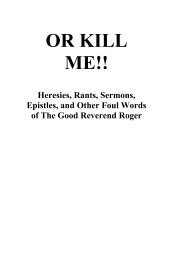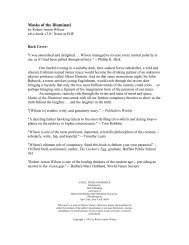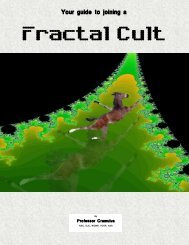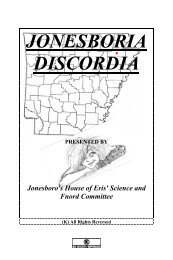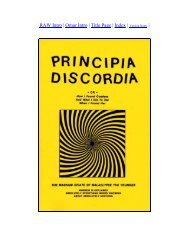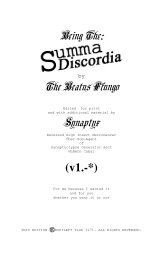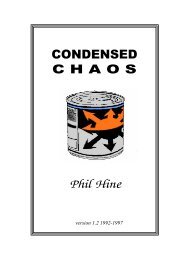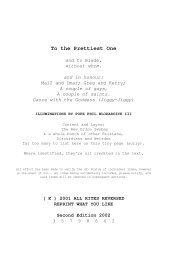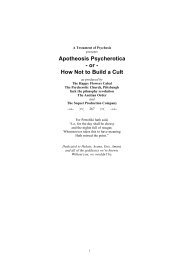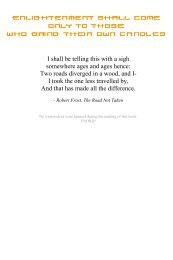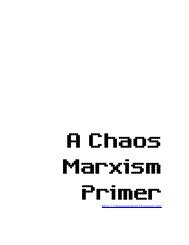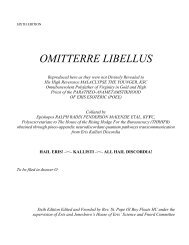Coincidance - Principia Discordia
Coincidance - Principia Discordia
Coincidance - Principia Discordia
You also want an ePaper? Increase the reach of your titles
YUMPU automatically turns print PDFs into web optimized ePapers that Google loves.
82 COINCIDANCE<br />
blacks and browns this side of downtown Passaic; this is the typical "feel" of a<br />
Ginsberg poem. Actually, of course, neither Rouault nor Ginsberg work in a<br />
frothing frenzy. Ginsberg in particular probably spends as much effort<br />
sounding "uncivilized" as Henry James ever spent in sounding "civilized."<br />
There has been little technical analysis of Ginsberg's verse thus far; the<br />
job requires an ear delicate as Pound's and the patience of an elephant. It<br />
generally takes me three or four readings aloud to feel my way toward<br />
Ginsberg's music; his great bass, as Pound would call it, is strong as a Watusi<br />
drum, but, like a Watusi drum, full of surprising polyrhythms and<br />
unexpected variations. I have heard that the poetry reviews in the Saturday<br />
Review, New York Times, etc. are actually written by machines; and, from the<br />
reviews Ginsberg has gotten in those and similar publications, I would<br />
gather that the machines in question, like most university poetry teachers,<br />
are not yet capable of following a meter more challenging than the<br />
traditional umpty-umpty-umpty (followed occasionally by umpty-umpty-UMty)<br />
Let's take a closer look at one of Ginsberg's oral constructions. A poem is a<br />
statue in sound, or "frozen architecture," or anyway you slice it it's basically a<br />
structure, a form manufactured by a man. The chief thing about Allen Ginsberg<br />
as a poet is that he always shows you his form emerging, the way it builds<br />
up, a thing created out of ordinary speech but suddenly, by the height of its<br />
emotion, transcending ordinary speech. Kaddish begins with words you or 1<br />
might speak:<br />
Strange now to think of you, gone without corsets & eyes, while I walk on<br />
the sunny pavement of Greenwich Village<br />
Like most modern poetry, this cannot be broken down into a traditional<br />
meter, but has to be considered in terms of Pound's Second Law of Imagism:<br />
"to write in the sequence of the musical phrase." There are three phrases<br />
above, the second syncopating slightly with the first, and the third a<br />
prolonged complication on both of the first two. It's rather like Charlie<br />
Parker taking off and searching for his theme. In a few lines Ginsberg finds<br />
his basic beat:<br />
. . . and I've been up all night, talking, talking,<br />
reading the Kaddish aloud, listening to<br />
Ray Charles blues shout blind on the phonograph<br />
the rhythm the rhythm<br />
We are still in the area of normal American speech, but Ginsberg is<br />
beginning to pick out of it his own building blocks. "And I've been up all<br />
night, talking, talking" ... "Ray Charles blues shout blind on the phonograph



